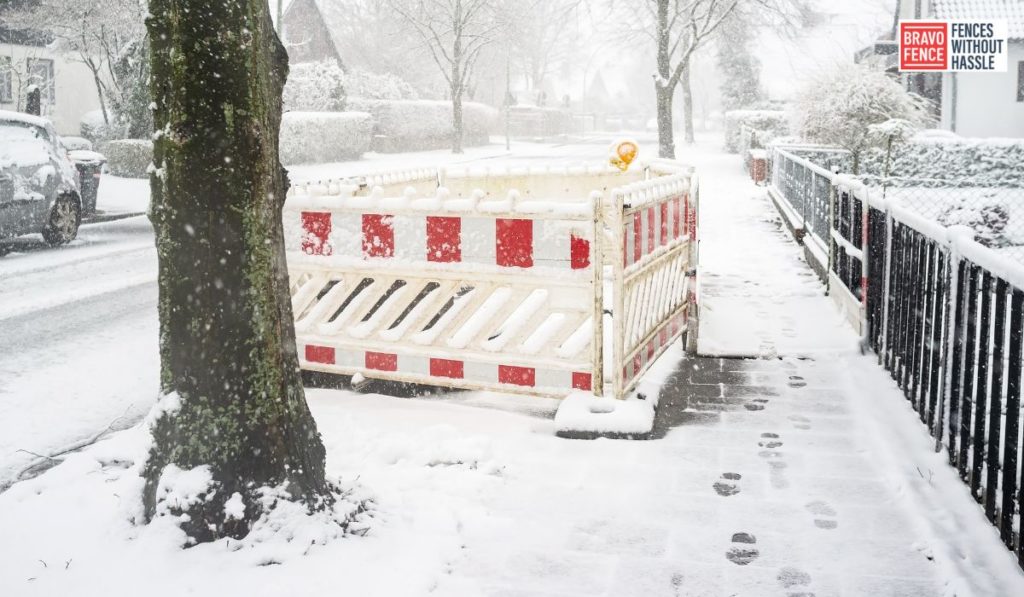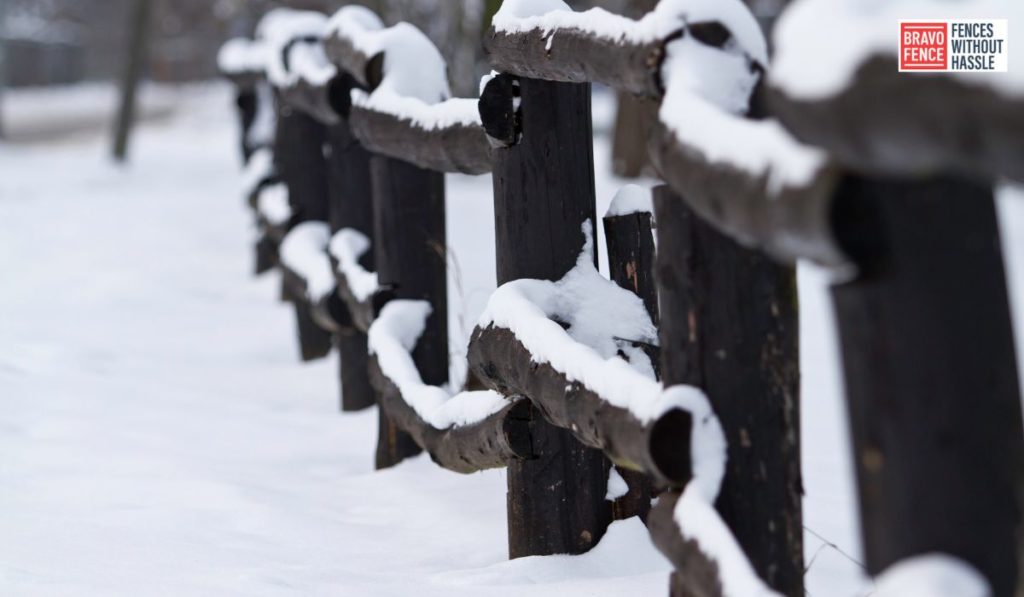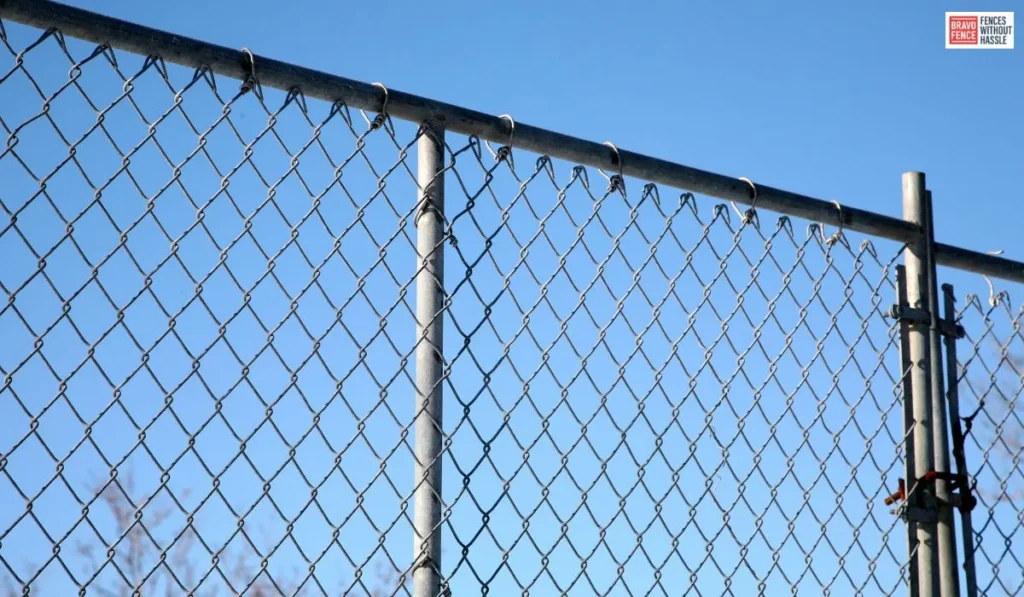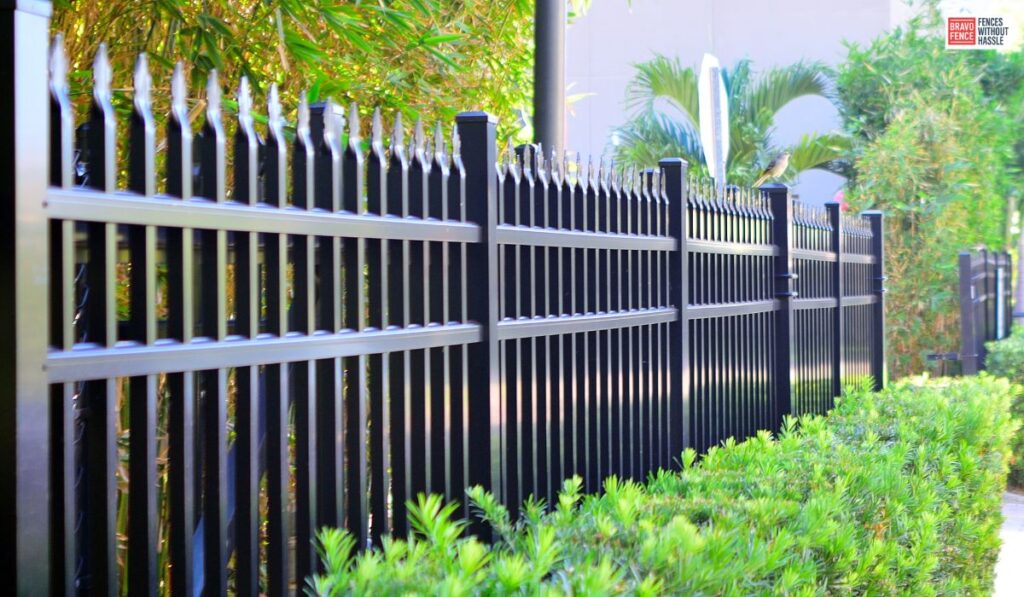The cold weather is coming, and it’s time to get your fence ready for the winter.
Winter can be tough on fences – snow and ice cause damage that will need to be repaired before the new spring arrives.
But there are also some important winter repairs you should do so your fence can last through the season without any more trouble.
In this blog post, we’ll discuss how to care for your fence in the winter so it stays strong and looks great all year long!
Caring for Your Fence in Winter
Although you may want to stay inside and bundled up, winter is an important time when it comes to maintaining your property.
If you have a fence, winter is the time to take care of it! It starts with having a good plan for prep and maintenance.
Here’s how to get started:
Prepare for Winter Fence Repairs
The first step in winter fence repairs is to properly prepare for winter!
Inspect all fencing for damage. Make sure to look for broken, loose, or missing boards and posts.
Repair as necessary.
Broken boards can absorb moisture in the winter and spread rot to other parts of your fence, so stop the damage now.
Check the gate hinges and latches to make sure they’re in good condition and functioning properly.
If not, fix them now rather than waiting until they break in the middle of winter.
Clear away any debris – leaves, snow, etc. – from around the fence so that it can’t accumulate and cause further damage.
Trim back any overhanging branches from trees near the fence line so they don’t rub against or damage the fence over time.
If you have tree limbs that hang over your fencing, it’s vital to trim them back before the snow and ice come.
Otherwise, the branches will attract a higher volume of water to the fence line, which could lead to a thick buildup of ice.
The limbs themselves can also get heavy with the presence of moisture and snow.
This can cause them to break off and damage your fencing or even your home.
If you take the initiative to trim them ahead of time, you don’t need to worry.
Important Winter Fence Repairs
Once winter has begun, there is also work to do to keep your fence in good working order, especially after a major storm.
Here are tips for caring for your fence in winter:

When winter snow and ice accumulate on top of your fence panels, the pressure can cause them to bow down.
This is why throughout the winter you’ll need to stay vigilant and continue to shovel off any excess winter snow from this area so that there isn’t added stress or extra weight pushing down on your fencing.
Along with removing winter debris like leaves before they get deposited onto the fence in autumn, these steps will help maintain a sturdy winter fence!
Winter Leaves and Snow
Throughout winter, leaves may pile up around your fence because of the wind.
If these piles are left uncared for over the span of winter, they could damage your fencing.
The leaves lock moisture around your fence, which could cause the posts to warp – or in the case of metal fencing, it can cause rust damage.
Piles of debris can also become a home for unwanted critters looking for a warm place to hide.
Additionally, if a pile of snow starts to form around your fence, use a rake or shovel to move it away from the edge of your property.
You don’t have to remove all of the snow because it will melt on its own.
Just focus on keeping tall drifts away from your fencing so the fence itself has time to dry and adjust.
Yes, it’s a little extra work in less than cozy temps, but it will go a long way in your winter fence maintenance.
A Fence, Not a Storage Closet
Some people improperly treat their fence line as a long wall to store yard equipment, ladders, sleds, pool toys, and more.
If you leave these items on the fence during the winter, snow and ice will pile on top of them.
This is just as harmful as a pile of leaves on the ground at the bottom of the fence.
If possible, move those items to the shed or garage until the weather gets warmer again, and avoid hanging things on your fence to prevent damage.
The weather volatility of the winter months can turn small fence issues into major fence damage.
If the posts are weakened, they may not be able to handle the expansion and contraction that comes with cold temperatures and melting snow.
Make sure repairs are done as quickly as possible so that the fence is sturdy enough to endure the winter.
Clean Your Fence When Winter Ends
When the snow melts away, and the rainstorms clear up, you may find that your fence looks a bit worse for the wear.
If your fence is looking dull or dirty it’s usually a pretty simple fix.
In fact, most fencing materials can be cleaned with high-pressure water or with a simple soap solution and a water rinse.
If you want to get your wood fence stained, a professional fence installation company can bundle cleaning in with your service.
As long as you follow good fence maintenance practices, your fencing will look great for many years to come.
Takeaways on Winter Fence Repairs
Winter is a tough time to be outside.
It’s cold, it’s dark, and snow can make everything slippery! But winter can also be a great time for fence repairs.
Now that the leaves have fallen from the trees, you’ll notice any damage or gaps in your fencing more easily.
You should take care of these problems now before they become worse and cause costlier fixes later on.
And remember, a good defense is the best offense for keeping your fence in working order.
That means the more effort you put into preparation and maintenance, the less you will contend with truly massive winter fence repairs.
And for any fence installation or repair needs, reach out to our experienced team at Bravo Fence Company!
We are always happy to help.
Conclusion:
As the cold weather approaches, it’s essential to ensure that your fence is ready to withstand the challenges of winter.
Snow, ice, and harsh conditions can take a toll on your fence, leading to damage that could become more problematic if not addressed promptly.
This blog post has provided valuable insights into preparing and maintaining your fence during the winter months, enabling it to remain strong and visually appealing throughout the season.
By conducting thorough inspections, addressing damage, and following proper winter maintenance practices, you can safeguard your fence and prevent the need for extensive repairs down the road.
Taking these steps not only ensures the longevity of your fence but also enhances the overall aesthetics of your property.
Remember, proactive care during winter can make a significant difference in preserving your fence’s durability and appearance.
FAQs
Why is winter preparation crucial for fences?
Winter brings adverse weather conditions that can damage fences, such as snow, ice, and freezing temperatures. Proper preparation helps prevent potential issues and keeps your fence in good condition.
How do I inspect my fence for winter damage?

Inspect for broken, loose, or missing boards and posts. Check gate hinges and latches, clear debris around the fence, and trim overhanging branches that could cause damage or ice buildup.
How does snow and ice affect fences?
Accumulated snow and ice can exert pressure on fence panels, causing them to bow or even break. It’s important to remove excess snow from the fence to prevent this damage.
What’s the impact of leaves on fences during winter?
Leaves can trap moisture around the fence, potentially causing warping, rust (in metal fences), and damage. Clearing leaves away prevents these issues.
Can I store items on my fence during winter?
It’s not recommended to use your fence as storage during winter. Snow and ice buildup on items can lead to fence damage. Store items in a shed or garage to prevent this.
Why is addressing fence damage promptly important during winter?
Cold temperatures and melting snow can exacerbate existing damage. Prompt repairs ensure your fence is sturdy enough to withstand winter conditions and prevent further deterioration.
How can I clean my fence after winter ends?
Cleaning your fence is relatively simple. Most materials can be cleaned with high-pressure water or a soap solution followed by a water rinse. Professional services can assist with fence staining and cleaning.
Winter offers a unique opportunity to spot and address fence issues before they worsen. Taking preventive measures and conducting timely repairs can save you from more extensive and costly fixes in the future.






